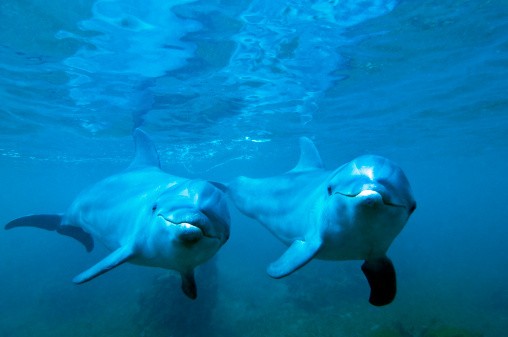'Tell me who your friends are, and I'll tell you who you are,' is an old proverb adopted in several cultures around the world. Some of the most powerful connections that make an impact in our adulthood are relationships built from our youth.
Some of the most successful people have the support of at least one strong and faithful friend, such as Bill Gates who developed Microsoft with his childhood friend Paul Allen. Similarly, dolphins pick their friends wisely while they're young.

Bottlenose dolphins are a common species recognized for their sophisticated intellect. Since the 1980s, researchers have studied more than 1700 wild bottlenose dolphins in Western Australia at Shark Bay.
A new study in Oxford Academic's Behavioral Ecology journal describes young dolphins that are weaning up to ten years old. Based on a recent behavioral study, here are three lessons we can learn from dolphins.
Spending More Time With Close Friends
Researchers from Duke University and Georgetown University observed who the young dolphins would hang out with when adults weren't present. They were devoted to eventually build connections that would help them in their adult life.
At around three or four years old, the dolphins wean from their protective mothers and learn how to socialize with other dolphins. The groups of young dolphins are constantly changing.
The team observed that the dolphins try to socialize with others frequently moving from group to group for up to ten minutes a day. However, they tend to spend more time with their closest friends. 'The juvenile period can be an opportunity to develop social skills that will be important in adulthood, without the high-stakes risks that go with sexual maturity,' Allison Galezo from Duke University.
In the same way, people should invest in growing their closest relationships. A handful of relationships built deep is better than numerous shallow acquaintances.
It's Ok to Have Preferences
Although it is important to be kind to everyone, it's okay to have preferences when it comes to your inner circle. After all, these relationships should be built on trust and loyalty.
With bottlenose dolphins, Galezo said, 'These relationships reflect true preferences.' Male dolphins were observed to spend more time together in physical activities such as swimming together and mirroring each other's' movements.
On the other hand, females socialized less and spent more time foraging fish. The authors also added that the forged bonds between young dolphins were more intentional and not the result of them living in the same waters. The contrast between female and male behaviors reflected their upcoming adulthood.
Read Also: Humans Can Talk To Dolphins In 2021 Using AI Technology
Developing Skills for Adulthood
For humans, a successful career involves strategic networking and building healthy professional relationships. This is a skill we develop well normally during college and adulthood.
Groups of adult male dolphins help each other out during the mating season. In Shark Bay, researchers have observed that two or three male dolphins help one of their mates to find a fertile female. The groups of male adults are strong alliances built since they were young.
With adult females, their success means taking care of their young until they have weaned at around three years old. Since nursing moms need extra calories, this is why young females spend more time hunting for food to be ready for motherhood.
Read Also: Dolphins Form Friendship through Shared Interest like Humans












